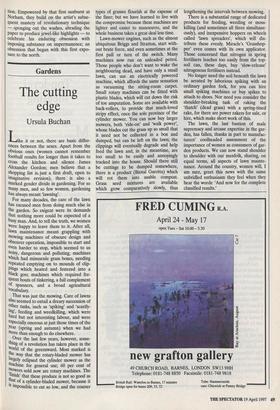Gardens
The cutting edge
Ursula Buchan
e it or not, there are basic differ- ences between the sexes. Apart from the obvious ones (women cannot remember football results for longer than it takes to cross the kitchen and silence James Alexander Gordon; men believe that a shopping list is. just a first draft, open to imaginative revision), there is also a marked gender divide in gardening. For so many men, and so few women, gardening has always meant lawning'.
For many decades, the care of the lawn has excused men from doing much else in the garden. So exigent were its demands that nothing more could be expected of a busy man. And, to tell the truth, we women Were happy to leave them to it. After all, lawn maintenance meant grappling with mowing machines of obscure design and obscurer operation, impossible to start and even harder to stop, which seemed to us noisy, dangerous and polluting; machines Which had minuscule grass boxes, needing repeated emptying on to mounds of clip- Pings which heated and festered into a black goo; machines which required fre- quent bouts of tinkering, a full complement of spanners, and a broad agricultural vocabulary. That was just the mowing. Care of lawns also seemed to entail a dreary succession of other tasks, such as 'spiking' and `scarify- ing', feeding and weedkilling, which were hard but not interesting labour, and were especially onerous at just those times of the Year (spring and autumn) when we had more than enough to do elsewhere. Over the last few years, however, some- thing of a revolution has taken place in the world of the greensward. Most marked is the way that the rotary-bladed mower has largely eclipsed the cylinder mower as the machine for general use; 60 per cent of Mowers sold now are rotary machines. The `finish' that these produce is not so good as that of a cylinder-bladed mower, because it is impossible to cut so low, and the coarser types of grasses flourish at the expense of the finer; but we have learned to live with the compromise because these machines are lighter and easier to manoeuvre, and the whole business takes a great deal less time.
Lawn-mower engines, such as the almost ubiquitous Briggs and Stratton, start with- out brute force, and even sometimes at the first pull or turn of the switch. Many machines now run on unleaded petrol. Those people who don't want to wake the neighbouring dead, and have only a small lawn, can use an electrically powered machine, which affords the same sensation as vacuuming the sitting-room carpet. Small rotary machines can be fitted with plastic blades, which will cut down the risk of toe amputation. Some are available with back-rollers, to provide that much-loved stripy effect, once the sole province of the cylinder mower. You can now buy larger mowers, both `ride-on' and 'walk power', whose blades cut the grass up so small that it need not be collected in a box and dumped, but can be left on the lawn; the clippings will eventually degrade and help feed the lawn and, in the meantime, are too small to be easily and annoyingly tracked into the house. Should there still be cuttings to be dumped somewhere, there is a product (Biotal Garotta) which will rot them into usable compost. Grass seed mixtures are available which grow comparatively slowly, thus lengthening the intervals between mowing.
There is a substantial range of dedicated products for feeding, weeding or moss- killing (and sometimes all three simultane- ously), and inexpensive hoppers on wheels called `lawn spreaders', which will dis- tribute these evenly. Miracle's 'Grasshop- per' even comes with its own applicator. Those concerned that nitrogen in spring fertilisers leaches too easily from the top- soil can, these days, buy 'slow-release' nitrogenous fertilisers instead.
No longer need the soil beneath the lawn be aerated by laborious spiking with an ordinary garden fork, for you can hire small spiking machines or buy spikes to attach to shoes. Nor need you consider the shoulder-breaking task of raking the `thatch' (dead grass) with a spring-tined rake, for there are power rakers for sale, or hire, which make short work of this.
The lawn, the last bastion of male supremacy and arcane expertise in the gar- den, has fallen, thanks in part to manufac- turers' coolheaded assessment of the importance of women as consumers of gar- den products. We can now stand shoulder to shoulder with our menfolk, sharing, on equal terms, all aspects of lawn mainte- nance. Around the country, women will, I am sure, greet this news with the same unbridled enthusiasm they feel when they hear the words: 'And now for the complete classified results.'


































































 Previous page
Previous page